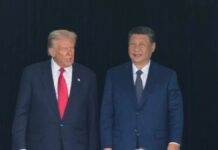Kathmandu: Tension is once again seen in Nepal’s politics. Prime Minister KP Sharma Oli has suddenly called an emergency meeting of ministers. According to Energy Minister Barsman Pun, the Group of Ministers has recommended President Bidya Devi Bhandari to dissolve the Parliament. There is no provision in the Constitution of Nepal to dissolve the House. Nepal’s opposition party Nepali Congress called an emergency meeting after recommending the dissolution of Parliament. The opposition may move the court against the Oli government’s decision.
At the same time, the ruling Nepal Communist Party spokesperson Narayanji Shrestha has said that this decision has been taken in haste as not all the ministers were present in the cabinet meeting this morning. It is against democratic norms and will overtake the nation. This cannot be implemented.
Nepal: At an emergency meeting called by PM KP Sharma Oli, the council of ministers recommends to dissolve the Parliament. “It (recommendation) has been sent to the President,” says Energy Miniter Barsaman Pun.
– ANI (@ANI) December 20, 2020
Oli had called an emergency cabinet meeting at 10 am on Sunday. It was believed that the Oli government would recommend the withdrawal of the amendments to the Constitutional Council Act (Functions, Duties and Procedures), 2010, but instead the Cabinet recommended the President to dissolve the Parliament.
Earlier, an ordinance related to the Constitutional Council Act brought by Oli was approved by President Bidya Devi Bhandari on Tuesday, which was under pressure from Oli to withdraw it. According to this, the council meeting can be called even if the quorum is not fulfilled.
Maryam Nawaz said – ECP will decide on holding elections, not Prime Minister Imran Khan
After the ordinance is approved, Oli has the authority to call a council meeting and take decisions even in the presence of three members. The President of the Constitutional Council is the Prime Minister. It consists of the Chief Justice, the Speaker of the House of Representatives and the Deputy Speaker, the Chairman of the National Assembly and the leader of the main opposition party as members. The council recommends appointment to key positions in important places such as constitutional institutions, the judiciary and foreign missions.











